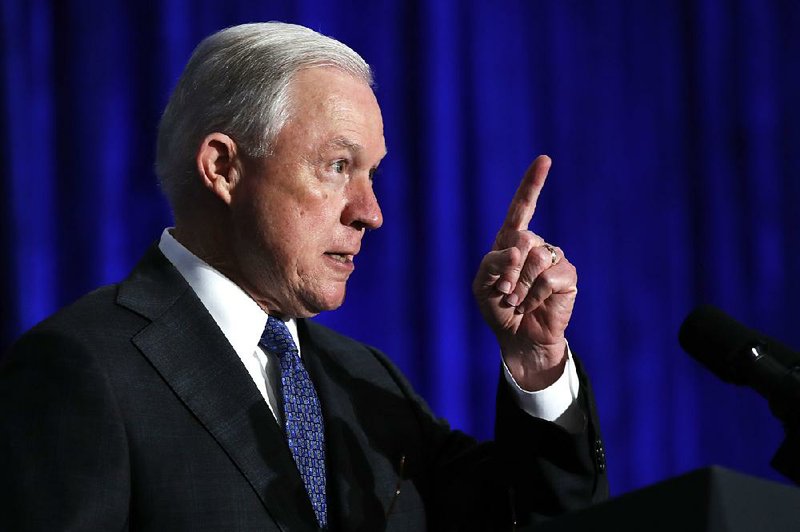WASHINGTON -- Attorney General Jeff Sessions visited Guantanamo Bay on Friday in a show of support for the prison he has called a "perfectly acceptable" place to detain new terrorism suspects, as opposed to holding them in the U.S. and having his own Justice Department try them in civilian courts.
Sessions traveled to the military detention center in Cuba with his deputy, Rod Rosenstein, and National Intelligence Director Dan Coats to gain "an up-to-date understanding of current operations," Justice Department spokesman Ian Prior said. It was Sessions' first trip there since becoming attorney general.
"Recent attacks in Europe and elsewhere confirm that the threat to our nation is immediate and real, and it remains essential that we use every lawful tool available to prevent as many attacks as possible," Prior said.
The first stop was the war court compound where the Pentagon holds pretrial hearings in cases against detainees. A court hearing was postponed until the afternoon to accommodate the visit. The postponement occurred as the chief war court judge, Army Col. James Pohl, has been complaining about insufficient resources to mount a robust schedule of 2018 hearings.
Sessions' party also toured the Detention Center Zone where, after an extensive downsizing effort by President Barack Obama's administration, the Pentagon holds 41 war prisoners, including five cleared for release.
Even as a senator from Alabama, Sessions was long a vocal supporter of the continued use of Guantanamo and its military commissions, calling it a "very fine place for holding these kind of dangerous criminals."
President Donald Trump said during the presidential campaign that he wanted the detention facility to remain open and promised to "load it up with some bad dudes." But he has not publicly announced any policy on the prison's future.
The embrace of Guantanamo Bay now represents a reversal of eight years of efforts to close the detention center, which opened on the base in January 2002 to hold and interrogate suspected enemy combatants.
Obama's administration sent no new detainees there, and though it didn't fulfill a promise to shut it down, it whittled the population from 242 to 41. That includes seven detainees facing charges by military commissions. All are in the pretrial stage, including the five men accused of planning and aiding in the Sept. 11, 2001, terrorist attack.
Obama's Justice Department maintained that the U.S. civilian court system was the most legally sound forum in which to prosecute terror suspects captured in the U.S. and overseas and cited hundreds of convictions in New York and other cities as proof.
Sessions and other Republicans have long expressed concern that civilian courts afford legal protections to which suspected terrorists are not entitled. He has warned that valuable intelligence can be lost if a detainee is advised of his right to remain silent and to have a lawyer.
Rosenstein, however, has said he expects terrorism cases to be handled through civilian trials.
Former Attorney General Eric Holder sought unsuccessfully in 2009 to move Khalid Sheikh Mohammed, suspected to be the ringleader of the Sept. 11 attacks, and four alleged co-conspirators from Guantanamo to New York for trial.
The other military commission death penalty case, of the alleged mastermind of the deadly October 2000 bombing attack on the USS Cole in Yemen, has been similarly bogged down for years in pretrial litigation. Both have stalled largely due to issues related to the fact that the defendants were held for years in clandestine CIA facilities and subjected to treatment now widely regarded as torture.
Other attorneys general have visited the site, including Michael Mukasey for President George W. Bush's administration in 2008 and Holder for the Obama administration in 2009.
The one-day visit was announced hours before a Saudi man was due at the war court for a presentencing hearing. Ahmed al-Darbi pleaded guilty to war crimes in February 2014, in exchange for a commitment to let him serve out his sentence of up to 15 years in his homeland starting next year.
Others on the tour included Adm. Kurt Tidd, the commander of the U.S. Southern Command, which has oversight of the prison; Navy Rear Adm. Edward Cashman, the detention center commander; and Col. Steve Gabavics, the head of the guard force, said Pentagon spokesman Air Force Maj. Ben Sakrisson.
Sakrisson declined to say whether they visited the prison's clandestine Camp 7, where former CIA captives are kept in military custody, in what he called a "standard tour of the camps."
Information for this article was contributed by Sadie Gurman and Ben Fox of The Associated Press and by Carol Rosenberg of the Miami Herald.
A Section on 07/08/2017
